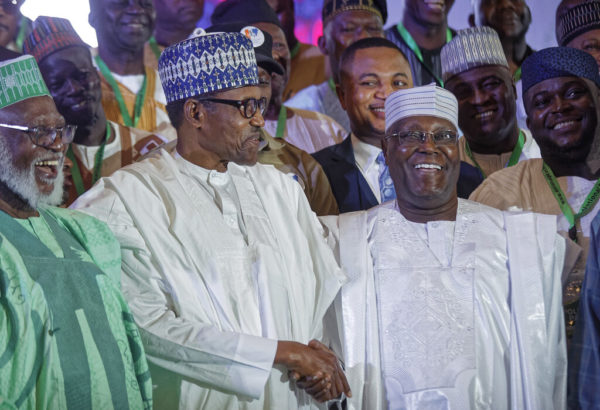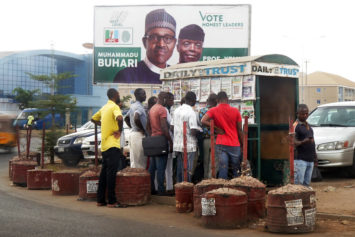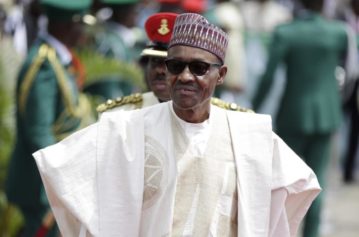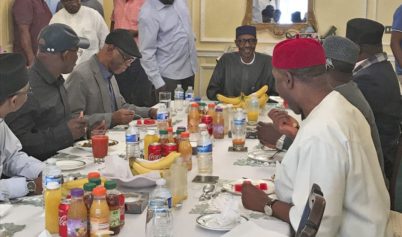ABUJA, Nigeria (AP) — Nigeria’s president and his top challenger in Saturday’s election have renewed a pledge of peace ahead of a vote marked by heated accusations that have alarmed some observers.
President Muhammadu Buhari, who seeks a second term, and former Vice President Atiku Abubakar on Wednesday vowed to contribute to a free and fair election in Africa’s most populous country and refrain from “religious incitement” or ethnic profiling.

Incumbent President Muhammadu Buhari, left, shakes hands with opposition presidential candidate Atiku Abubakar after signing an electoral peace accord at a conference center in Abuja, Nigeria Wednesday, Feb. 13, 2019. Nigeria is due to hold general elections on Saturday, Feb. 16, 2019. (AP Photo/Ben Curtis)
Past elections in Nigeria have been marked by deadly violence, though the previous vote in 2015 was relatively calm. It saw the first defeat of an incumbent and first democratic transfer of power between parties.
In this campaign the top two parties have hurled accusations of vote-rigging plots.
Atiku at the signing quoted former President Goodluck Jonathan, saying that “my ambition is not worth the blood of any Nigerian.”
Buhari told the crowd that “we’ll vote according to parties but in the end the only real party is Nigeria, our country.” He called the 2015 vote one of the most peaceful in the country’s history.
All of the presidential candidates, more than 70 of them, were urged by the chair of the National Peace Committee not to “do anything to make a bad situation worse.”
With just a few days left before the vote, troubles have multiplied. Nigeria’s election commission reported that one of its offices had burned with more than 4,600 smart card readers meant to be used in the voting “destroyed in the inferno.” This is the third such fire in the past two weeks.
Several people were crushed to death in a stampede on Tuesday during a ruling party rally in Rivers state in the south, seen as one of the potential hotspots of election violence. A video obtained by The Associated Press shows at least seven bodies lying amid abandoned clothes and shoes.
The push for candidates to publicly renew their peace pledge, first made in December, picked up in earnest in recent days after the governor of Kaduna state declared on television that anyone who came to Nigeria to intervene in the election “would go back in body bags.”
Election observers from the European Union quickly protested the comments and clarified their role as impartial. A number of foreign observer teams are set to monitor the vote. With tempers high, local media report that Nigeria’s inspector general of police has assured protection to foreign election observers.
Another spat erupted following a statement by the U.S. ambassador in which he warned that anyone inciting violence would be held to account.
The ruling party objected to the ambassador’s remarks, issuing a statement saying that he “seeks to shrink our ambit of free speech so that we may behave in accordance with their vision of well-behaved Africans.”
In recent days, Nigeria’s security forces have pledged to do their best for a peaceful election. Police this week said they would detach officers accompanying top officials to free them up for wider duty and to avoid any “undue advantage.”
At stake in Nigeria’s election is a vibrant country of some 190 million people, including more than 84 million registered voters, that is Africa’s largest economy and oil producer. And yet the sluggish economy is still recovering from recession and excessive dependence on crude oil exports, while high unemployment, corruption and poor infrastructure continue to hamper Nigeria’s vast potential.
Scores of Atiku’s supporters gathered inside his campaign headquarters in Abuja Wednesday for what they called “a national day of prayer” over alleged plans to rig the election in favor of the incumbent.
“If God can intervene, the rigging mechanism put in place cannot stand,” said Bonaventure Chimee, head of the Atiku prayer support group. “The essence is to pray for total victory. I am worried because when you look at what is happening, they want to rig the election. That is the attitude and posture of the ruling party.”
There are concerns within the opposition and among some election observers about military deployments in southeastern Nigeria that is threatened by a separatist group. The military patrols will suppress the vote in the area, a group of more than a dozen civic groups said in a statement Wednesday.
Ez Onyekpere of the Abuja-based Center for Social Justice, told The Associated Press Wednesday that the deployments are likely to intimidate voters in a region where President Buhari is widely unpopular.
“We are saying mobilizing that number of soldiers is some form of vote suppression, particularly when the president knows he is not popular in that region and is going to lose heavily,” he said.


